1. Clotheslines
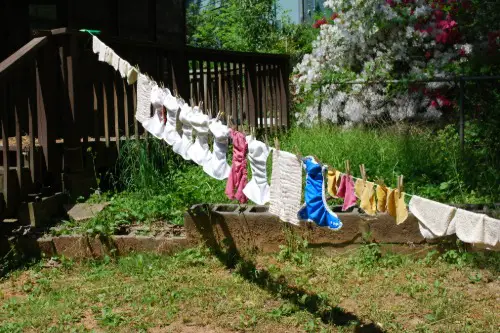
Hanging your clothes out to dry might seem like a harmless way to save on energy bills, but it’s banned or restricted in some places. Many homeowners’ associations (HOAs) and municipalities consider them unsightly and prohibit them altogether, according to House Digest. In states like Florida and California, “right to dry” laws protect homeowners from these bans, allowing them to use clotheslines despite HOA rules. However, in other areas, strict neighborhood regulations still prevent residents from drying laundry outdoors.
The reasoning behind these bans is mostly aesthetic, as some people think clotheslines lower property values. Critics argue that preventing people from using them forces unnecessary reliance on electric dryers, which waste energy. Some states have pushed back, ensuring homeowners have the right to use clotheslines as an eco-friendly alternative. But in certain communities, you might still face fines or complaints for hanging your laundry outside.
2. Rainwater Collection Systems

It might seem like an eco-friendly way to water your plants, but collecting rainwater is actually restricted in some states. For example, Colorado has strict limitations on personal rainwater collection, arguing that it could interfere with water rights, according to the US Environmental Protection Agency. While the laws have loosened, homeowners are still only allowed to collect up to 110 gallons in designated barrels. Other states, like Utah and Nevada, also regulate rainwater harvesting to protect regional water supplies.
These laws exist because water rights are a big deal in dry regions where every drop counts. Some officials worry that widespread collection could reduce the amount of water that naturally flows into rivers and reservoirs. However, many environmentalists argue that small-scale rainwater harvesting has little effect on overall water availability. As climate concerns grow, more states are reconsidering these restrictions to encourage sustainability.
3. Outdoor Fire Pits
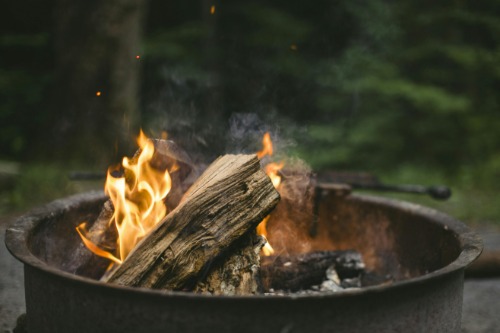
There’s nothing better than sitting around a crackling fire in your backyard, but according to The New York Times, in some places, that’s against the law. States like California and Massachusetts have strict regulations on outdoor fire pits due to wildfire risks and air quality concerns. Even where fire pits are allowed, you may need a permit or have to follow specific rules, like keeping them a certain distance from structures. In highly regulated areas, local fire departments may require periodic inspections to ensure compliance.
The main concern is the potential for sparks to ignite nearby vegetation, especially in dry climates. Some laws also restrict burning certain materials, like treated wood, because they release harmful chemicals into the air. While propane and gas fire pits are often legal alternatives, even those may be restricted during high-risk fire seasons. Before installing a fire pit, it’s best to check local codes to avoid fines or forced removal.
4. Home Solar Panels
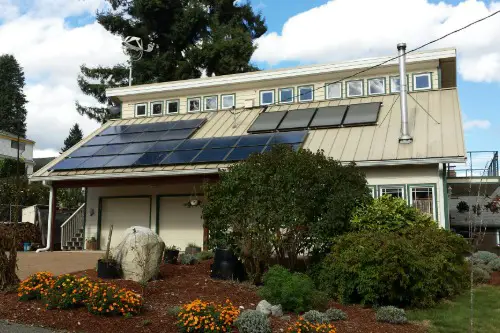
You’d think switching to solar power would be encouraged everywhere, but in some states, it’s surprisingly complicated. Certain HOAs and local governments in places like Florida and Texas have tried to block or restrict homeowners from installing solar panels, according to The Los Angeles Times. While many states have enacted laws protecting the right to solar energy, loopholes still allow some restrictions based on aesthetics or zoning rules. In some cases, neighbors or community boards can veto a homeowner’s solar panel plans.
The pushback often comes from utility companies that see widespread solar adoption as a financial threat. Some local governments also worry that solar panels affect property values or clash with neighborhood aesthetics. Homeowners in restrictive areas may have to fight lengthy legal battles just to install panels on their own roofs. Fortunately, advocacy groups are working to change these outdated rules and make solar energy more accessible.
5. Tiny Homes
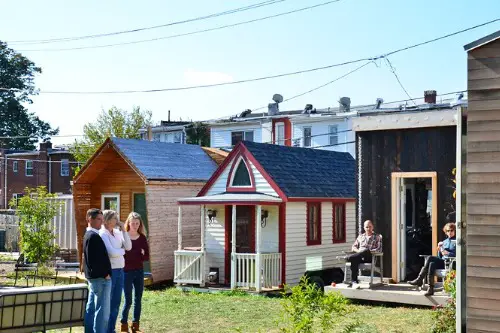
Tiny homes have exploded in popularity as a minimalist and affordable housing option, but many states make them hard to live in legally, according to Green Matters. In places like New York and New Jersey, zoning laws often classify tiny homes as temporary structures, making it illegal to live in them full-time. Some municipalities also have minimum square footage requirements that tiny homes don’t meet. Even in states that allow them, homeowners may struggle to find legal places to park their tiny houses.
The main reason for these restrictions is that local governments rely on property taxes, and tiny homes generate less revenue than traditional houses. Additionally, some officials worry that tiny home communities could lower surrounding property values or create overcrowding issues. Supporters argue that tiny homes provide an affordable housing solution, especially in expensive cities. As demand grows, some states are revising their laws to be more tiny-home-friendly.
6. Certain Dog Breeds

Some states and cities have laws banning specific dog breeds from residential homes, even if the dog has never shown aggression. Commonly banned breeds include pit bulls, Rottweilers, and Doberman Pinschers, often due to concerns about attacks or liability issues. Cities like Denver and Miami have had long-standing breed-specific legislation (BSL) that prohibits residents from owning certain dogs. Even if you already own a restricted breed, you might be forced to move or give up your pet.
Supporters of these laws argue that certain breeds pose a higher risk of attacks, especially in densely populated areas. However, critics say these bans are unfair and don’t account for individual dog behavior or responsible ownership. Many animal advocates push for laws that target irresponsible owners rather than specific breeds. Some states have even passed legislation preventing cities from enforcing breed-specific bans.
7. Colored House Paint
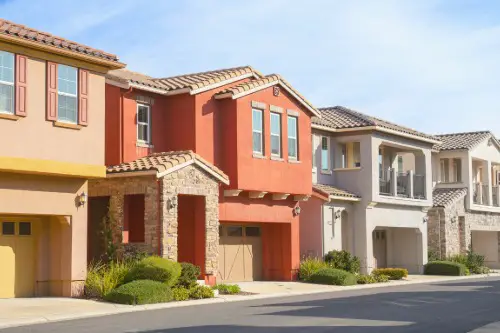
Believe it or not, you can’t just paint your house any color you want in some places. Many historic districts and planned communities enforce strict color palettes to maintain a uniform appearance. In Charleston, South Carolina, and Santa Fe, New Mexico, homeowners must get approval before painting their homes in anything outside the approved colors. Even some modern neighborhoods have rules banning bright or unconventional colors like neon green or deep purple.
These restrictions are often put in place to preserve a city’s historic charm or maintain property values. While some people appreciate the consistency, others find the rules frustratingly restrictive. Violating these regulations can result in hefty fines or even legal action forcing you to repaint your home. Before breaking out the paintbrush, it’s always wise to check local guidelines to avoid costly mistakes.
8. Home-Based Businesses

Running a small business from your home might seem like the perfect setup, but in some states, it’s not allowed. Zoning laws in places like California and New York often restrict home-based businesses, especially those that generate foot traffic. Even online businesses can face legal hurdles if they require significant storage or deliveries that disrupt the neighborhood. Some states require special permits, and failing to obtain one can lead to fines or shutdowns.
These restrictions are meant to prevent residential areas from turning into commercial hubs. However, critics argue that modern home businesses, like online shops or freelancing, don’t cause the same disruptions as traditional storefronts. As remote work becomes more common, some states are easing up on these outdated restrictions. Still, if you’re planning to start a home business, it’s best to check local zoning laws first.
9. Front Yard Vegetable Gardens

Growing your own food sounds like a great way to save money and eat healthier, but in some places, front yard vegetable gardens are banned. Cities like Miami Shores, Florida, have enforced rules prohibiting vegetable gardens in front yards, arguing that they disrupt neighborhood aesthetics. Homeowners in some areas have even faced fines for growing tomatoes, lettuce, or other edible plants in their front yards. While backyard gardens are usually allowed, not everyone has the space or sunlight needed for one.
The reasoning behind these bans is often based on outdated zoning laws designed to maintain a uniform, suburban look. Some officials argue that vegetable gardens attract pests or lower property values, despite the growing popularity of urban farming. Many homeowners have fought back, and some states, like Florida, have passed laws protecting the right to grow food on private property. Still, depending on where you live, you might need to stick to flowers and shrubs if you want to avoid legal trouble.
10. Wind Turbines

If you’re looking to generate your own power with a small wind turbine, you might run into some legal barriers. Many states and municipalities, including parts of Illinois and Massachusetts, have strict regulations on residential wind turbines due to noise, height, and aesthetic concerns. Some HOAs also prohibit them outright, arguing that they disrupt neighborhood appearances. Even in areas where they are allowed, homeowners often need permits and must follow strict placement rules.
One major concern is that wind turbines can generate noise that might bother neighbors, even though modern models are relatively quiet. Some lawmakers also fear that widespread use of private turbines could complicate power grid management. However, renewable energy advocates argue that these restrictions discourage people from adopting sustainable energy solutions. While some states are making it easier for homeowners to install wind turbines, others still enforce tight restrictions.
11. Underground Bunkers
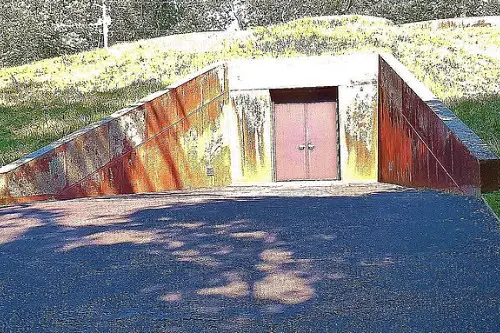
Building an underground bunker might seem like a great way to prepare for emergencies, but in some states, it’s not so simple. Many areas, including parts of California and New York, have strict building codes that either heavily regulate or outright ban underground structures. Officials often cite safety concerns, such as potential collapses, flooding, or improper ventilation. Even in states where bunkers are legal, homeowners usually need special permits and inspections.
Some local governments also worry that underground structures could interfere with water lines, gas pipes, or other infrastructure. Additionally, some zoning laws prohibit residential properties from having habitable underground spaces that aren’t officially classified as basements. Despite these restrictions, the popularity of doomsday prepping and emergency preparedness has led to increased demand for private bunkers. In response, some states are re-evaluating their laws to allow safer, properly regulated bunker construction.
12. Outdoor Clothes Storage
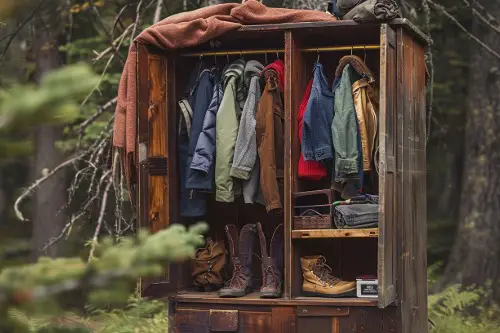
Leaving items like bikes, kayaks, or storage bins in your yard might seem harmless, but in some places, it’s against the rules. Many HOAs and city ordinances, especially in states like Texas and Virginia, have strict rules about what can be stored outdoors. Some areas ban visible storage units, even if they are neatly arranged, arguing that they create visual clutter. Homeowners who violate these rules can face fines or be forced to remove their outdoor belongings.
These restrictions are typically enforced to maintain property values and keep neighborhoods looking uniform. While some people appreciate the tidiness, others see these rules as unnecessarily strict, especially for families with active outdoor lifestyles. Some cities allow storage as long as items are covered or kept behind fences, but enforcement varies widely. If you’re planning to store anything outside, it’s a good idea to check local regulations first.
13. Rooftop Decks
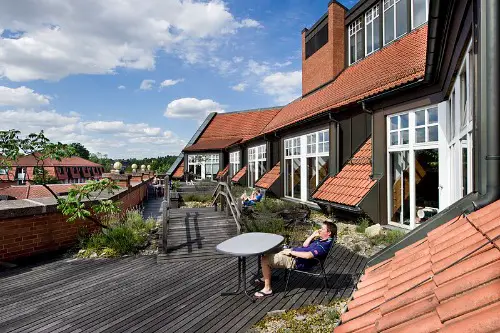
A rooftop deck sounds like the perfect spot to relax and enjoy a sunset, but in some places, they’re not allowed. Cities like San Francisco and Boston have zoning laws that make it difficult to get approval for rooftop decks due to privacy and safety concerns. Some areas worry that rooftop gatherings could create noise disturbances or allow people to see into neighboring properties. Even when decks are permitted, strict building codes often require reinforced structures and safety railings.
The main issue is that adding a rooftop deck can affect the structural integrity of a building, especially in older homes. Some cities also limit them to prevent excessive population density in certain neighborhoods. However, many homeowners see these restrictions as outdated and argue that rooftop spaces can be an efficient way to use limited outdoor space. If you’re considering adding a rooftop deck, be prepared for a potentially lengthy permitting process—or a firm “no” from your local government.


